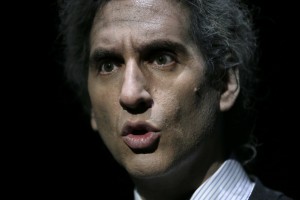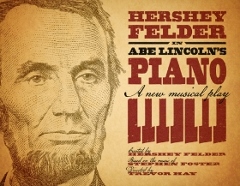SIC SEMPER BORE-ANNUS
This solo musical effort by musician performer Hersey Felder has all the trappings of a work that is rich with worthy subject matter and culture. Peppered with songs from what we’d charitably call “the American songbook” (Gershwin, Stephen Foster, Louie Gottschalk), Abe Lincoln’s Piano is Felder’s tightly crafted autobiography, which is somehow threaded through his lifelong admiration and adoration of our Sixteenth President (you know, the one who wore the stovepipe hat and had those muttonchop whiskers).
The problem, and it’s not a minor one, is that while the work smacks of being “good for you,” it just frankly isn’t all that “good.” You can’t help but feel like you’re choking down a mouthful of wheat germ and Brussels sprouts while listening to Felder’s writing and watching his sober line readings. You force down the research and the wisdom like a good boy doing his vitamins, but the play itself is an awkwardly inconsequential and intermittently trite opus, which tends to substitute easy sentiment for genuine, earned emotion.
 Felder, an amiable performer whose fluffy black hair flows around his head in classical maestro-style, has made a reputation touring with solo stage biographies of composers such as Gershwin and Liszt. Here he tells of his own childhood in Montréal, growing up with a mother who endowed him with a love of good ole American music. When Felder grows up and is invited to play a concert (by now he’s a concert pianist, you see) at Ford’s Theater in Washington D.C., he becomes fascinated with the life of Mr. Lincoln, particularly his death at the hands of the actor John Wilkes Booth. This leads Felder to discover the diary of the doctor who treated the President on the night he died – and from there his research leads him to explore the types of music Lincoln would have liked and the songs that the boys fighting in the Civil War might have enjoyed.
Felder, an amiable performer whose fluffy black hair flows around his head in classical maestro-style, has made a reputation touring with solo stage biographies of composers such as Gershwin and Liszt. Here he tells of his own childhood in Montréal, growing up with a mother who endowed him with a love of good ole American music. When Felder grows up and is invited to play a concert (by now he’s a concert pianist, you see) at Ford’s Theater in Washington D.C., he becomes fascinated with the life of Mr. Lincoln, particularly his death at the hands of the actor John Wilkes Booth. This leads Felder to discover the diary of the doctor who treated the President on the night he died – and from there his research leads him to explore the types of music Lincoln would have liked and the songs that the boys fighting in the Civil War might have enjoyed.
Felder’s text is certainly rich with historical detail and his renditions of “Yankee Doodle Dandy” and “My Old Kentucky Home” are undeniably evocative, particularly as they are presented in the context of their time. However, Felder’s personal anecdotes never seem part of any cohesive narrative line, and the lack of a story just reduces the work to scattershot historical background. Director Trevor Hay’s straightforward direction is generally lecture-like, although the projected slide images and Lawrence Siefert’s moody lighting add a layer of eeriness.
Felder’s play is unable to evade a sense of banality: The observations made are strictly prosaic and surface level – war is bad, Abraham Lincoln was a great man, “Home! Sweet Home!” is a sweet little song – and one is hard pressed to locate deeper or fresher emotional meaning. There’s also a faint whiff of self-indulgence, as Felder at times seems to be making the argument that he alone is sensitive enough to put together the pieces of Lincoln’s life. It occurs to us that part of the show’s theme might be the fact that Felder is Canadian and thus is supposed to bring an outsider’s perception to its sensibility. If that’s the case, though, one has a right to expect something more scintillating than Felder’s rather numbingly standard observations and comments.
[Editor’s Note: Here are Stage and Cinema’s reviews of previous incarnations of Felder’s Lincoln shows: An American Story for Actor and Orchestra at the Royal George in Chicago and Lincoln: An American Story at the Pasadena Playhouse in Los Angeles.]
photos courtesy of the Geffen Playhouse
Abe Lincoln’s Piano
Geffen Playhouse
10886 Le Conte Avenue in Westwood
scheduled to end on February 13, 2014
for tickets, call 310.208.5454 or visit www.geffenplayhouse.com
